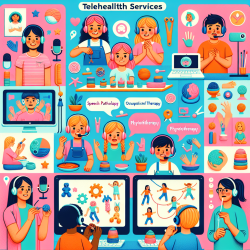Introduction
In an era where mental health awareness is increasingly critical, the demand for qualified school psychologists is at an all-time high. The research article, "Increasing School-Based Mental Health Services with a 'Grow Your Own' School Psychology Program," highlights an innovative approach to addressing this shortage, particularly in rural areas. As a passionate advocate for children's outcomes, I am excited to share insights from this study and explore how practitioners can enhance their skills and contribute to this cause.
The Growing Need for School-Based Mental Health Services
Data from the 2016 National Survey of Children's Health indicates that approximately 17% of U.S. children aged 5 to 18 have experienced at least one mental health disorder. Despite this, less than half receive the necessary treatment. The shortage of school psychologists exacerbates this issue, with only seven states meeting the recommended ratio of one psychologist per 500-700 students. This gap is particularly pronounced in rural areas, where recruitment challenges are more significant.
The "Grow Your Own" Approach
The "Grow Your Own" program, as described in the research, offers a promising solution. By focusing on recruiting local professionals into school psychology roles, this initiative addresses both the shortage and the unique needs of rural communities. The program's success hinges on several key components:
- University-District Partnerships: Strong collaborations between universities and educational agencies ensure that training aligns with local needs.
- Residency Programs: Extensive field experiences integrated with coursework prepare candidates for the realities of the profession.
- Financial Incentives: Loan forgiveness, tuition reimbursement, and retention bonuses make the career path more accessible and appealing.
- Cohort Model: Building a supportive network among participants fosters collaboration and shared learning.
Opportunities for Practitioners
Practitioners looking to enhance their skills or transition into school psychology can benefit from this model. The program's structure allows for continued professional development while addressing the urgent need for mental health services in schools. By participating in such initiatives, practitioners can:
- Gain specialized training in mental health and behavioral interventions.
- Contribute to systemic change by advocating for expanded roles in school psychology.
- Join a community of like-minded professionals committed to improving student outcomes.
Encouraging Further Research
While the "Grow Your Own" program shows promise, further research is essential to refine and expand its impact. Practitioners are encouraged to engage with ongoing studies, contribute to data collection, and advocate for policy changes that support sustainable mental health services in schools.
Conclusion
The "Grow Your Own" program represents a significant step forward in addressing the shortage of school psychologists and enhancing mental health services for students. By embracing this model, practitioners can play a pivotal role in shaping a brighter future for children. To read the original research paper, please follow this link: Increasing School-Based Mental Health Services with a “Grow Your Own” School Psychology Program.










